Ubuntu Lucid Lynx ships with fast boots, social networking
Apr 29, 2010 — by Eric Brown — from the LinuxDevices Archive — 10 views[Updated: 2PM] — The Canonical-backed Ubuntu project today released final Ubuntu 10.04 LTS Desktop, Server, and Netbook Editions of its popular Linux distro. Code-named “Lucid Lynx,” Ubuntu 10.04 features faster boot times, a new MeMenu social networking interface, the GNOME 2.3 desktop, and greater integration with the Ubuntu One cloud service, including a music store.
Officially announced on Tuesday by London-based Canonical, but only appearing for download today, the final edition of Ubuntu 10.04 LTS (Long Term Support) once again nudges Linux forward as a more consumer-palatable contender to Windows on the desktop.
Meanwhile, a Moblin-imbued netbook edition sets the bar high for Google with its upcoming Chrome OS debut. In addition the server edition appears to have grown ever closer to matching the capabilities of established enterprise server distros from Red Hat and Novell.
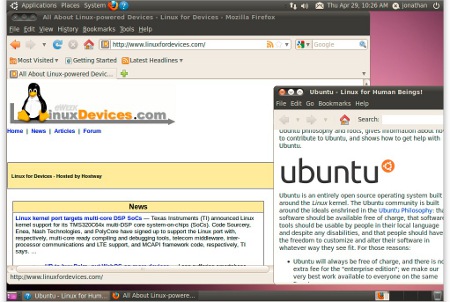
Ubuntu 10.04 LTS Desktop Edition
(Click to enlarge)
In our own tests today of the final desktop version of Ubuntu 10.04, a notebook computer with a 2.4GHz Intel Core 2 Duo T8300 CPU booted Lucid Lynx to the login prompt in 30 seconds, and to a usable desktop in 42 seconds overall. The same machine took 54 seconds to boot Windows 7 to its login prompt, and, again, required just over ten seconds more (64 seconds total) for a usable desktop.
Ubuntu Netbook Edition touted for "super-fast" SSD boot-up
Canonical makes no specific speed claims for boot-time, but notes that on the netbook edition of Ubuntu 10.04, boot-time is "super-fast on SSD-based machines such as netbooks." The Ubuntu Netbook Edition (UNE) is also said to offer faster suspend/resume times that are not only more convenient, but can extend battery life, says the company.
Designed for smaller netbook screens, UNE adopts optimizations from the Moblin project to speed performance on Intel Atom-based netbooks, says the Ubuntu project. In February, it was revealed that UNE 10.04 would offer a new 2D ARM interface based on Enlightenment Foundation Libraries said to vastly improve graphics on low-cost ARM-based netbooks. (IBM and Canonical subsequently announced that the IBM Client for Smart Work Linux distro, based on UNE, was being marketed in Africa on a a Simmtronics Simmbook netbook that costs just $190.)
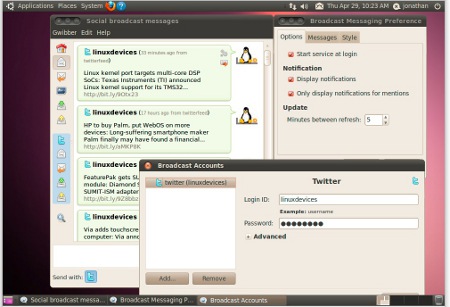
Ubuntu 10.04's MeMenu
(Click to enlarge)
A distro for the new Me decade
Also new is the Gwibber-based "Me Menu" for social networking integration of Facebook, Digg, Twitter, and Identi.ca updates (see images above and below). The MeMenu is said to support a multi-column view for monitoring multiple feeds simultaneously. In addition the Me Menu integrates Empathy chat channels, including Google Talk, MSN, IRC, and other IM technologies.
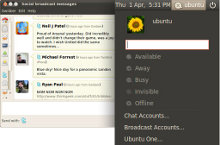
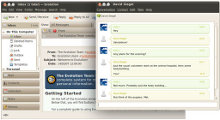
MeMenu (left) and Empathy chat integration (right)
(Click on either to enlarge)
New Software Centre features are said to include filtering by vendor source. For example, users can select software solely from the Ubuntu project or from Canonical partners. They can also quickly scan software written by developers who use Canonical's Launchpad Personal Package Archive (PPA) hosting service.
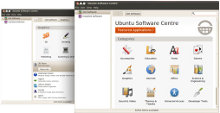
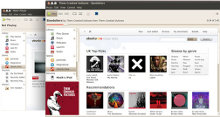
New Software Centre (left) and Ubuntu One Music Store
(Click on either to enlarge)
One key new enhancement is the addition of the open source Nouveau video driver as the default for nVidia graphics hardware in place of the -nv driver. Improvements in the Nouveau video driver include kernel mode setting for improved resolution detection, says Canonical. Three proprietary Nvidia drivers are also said to be available.
GNOME 2.3 spiffs up Nautilus file manager
The Ubuntu desktop has been updated with the GNOME 2.30 or KDE SC 4.4 desktop environments, as well as the lightweight alternative, XFCE 4.6.1.
The default GNOME 2.30 features an updated Nautilus file manager, which offers a new split view mode. In addition, Nautilus is now set to browser mode by default, replacing spatial mode. GNOME's Empathy IM app and Tomboy Notes synchronization app are also said to have been significantly upgraded, among other features.
Ubuntu's likewise-open package, which provides Active Directory authentication and server support for Linux, has received a major update to version 5.4 in Lucid Lynx, says the project. Application updates, meanwhile, are said to include OpenOffice.org 3.2.0 and X.Org server 1.7.5.
The Ubuntu project also did a little housekeeping, removing some components that were getting in the way. The already depreciated HAL (hardware abstraction layer) is now gone, which is said to have helped improve boot times. Among other changes, the GIMP image editor has been replaced with the simpler F-Spot app, and a PiTiVi open source video editor is also available.
Ubuntu One cloud gets musical
Ubuntu has now been further integrated with Canonical's Ubuntu One online "cloud" service, enabling files and folders to be shared and saved on the cloud more easily, says Canonical. The new version also adds bookmark and contacts sharing with Ubuntu One, which is available free to Ubuntu users with 2GB of free storage.
A new Ubuntu One Music Store, meanwhile, offers music from "the world's largest labels and greatest bands," available via the default music player, says Canonical (see image farther above). Music can be stored on Ubuntu One, and music can be shared among Ubuntu-ready devices, says the company.
For more serious cloud activities, the Ubuntu Enterprise Cloud (UEC) installer has been "vastly improved," says Canonical. UEC components are now automatically discovered and registered, including those supporting complex, alternative topologies. In addition, UEC is based on an upgraded Eucalyptus 1.6.2 codebase, says the company.
Stated Jane Silber, who recently took over Canonical's CEO duties from founder Mark Shuttleworth, "Changes like the new look and feel and the addition of a music store, layered on top of our relentless focus on delivering an intuitive and attractive user experience for new and existing Ubuntu users — these are the bridging elements to the mainstream market that our community, our partners and our users really want."
Availability
The Ubuntu 10.04 LTS Desktop Edition and Ubuntu 10.04 Netbook Edition are available for free download, with three years of support through free security and maintenance updates. The distros will be "pre-installed on a range of machines from a number of manufacturers in Summer 2010," says Canonical.
Downloads and additional information are available from Ubuntu's home-page, here.
This article was originally published on LinuxDevices.com and has been donated to the open source community by QuinStreet Inc. Please visit LinuxToday.com for up-to-date news and articles about Linux and open source.